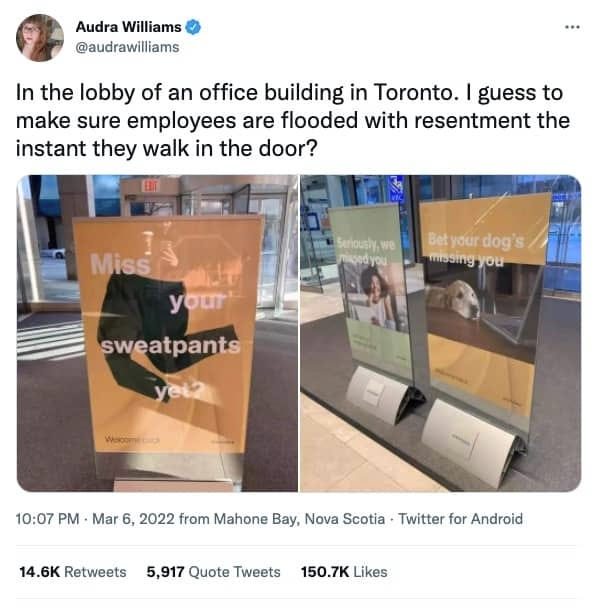Return-to-Office Moment Drives DiscordReturn-to-Office Moment Drives Discord
Big tech and other companies are mandating employees return to the office, at least on a hybrid basis, after two years of pandemic-driven work-from-home. Will employees show up? Or will they quit?

“Bet your dog is missing you.” That was the message on one of the poster boards in the lobby of a Toronto office building in March 2022 to welcome workers back to the office. But for office workers who spent the past two years working from home during a pandemic and maybe adopted a dog during that time -- well, that message may have seemed a little cruel.
Eventually even the people who placed the poster board in the lobby admitted that their attempt at a light-hearted joke hit the wrong tone.
The episode illustrates today’s disconnect between the factions that want workers to return to the office and the factions of workers who have grown accustomed to the increased productivity and convenience of working remotely. The current return-to-office moment has a distinct undertone of discord.

That may be part of what’s behind a kind of compromise setup of “hybrid” work now, in which workers spend a few days per week in the office and a few days per week working from home. For instance, many big tech companies have recently required workers to come back to the office for a few days a week in this type of hybrid arrangement.
Google, Microsoft, Apple go hybrid
Google’s hybrid work arrangement of three days in the office and the rest of the time remote began this week, although the company’s former head of HR told Bloomberg that he thought the arrangement wouldn’t last because managers want their employees in-house and employees will lose out on promotions and choice assignments if they aren’t in the office. Some employees were critical of the plan for different reasons, and reportedly questioned the need for a back-to-office mandate in an all-company meeting in March. Microsoft, Apple, and others are also requiring workers to be in the office at least part of the time. “Hybrid” is the word of the moment.
“Everyone is talking about hybrid work, and no one has got it figured out yet,” says Tim Banting, Omdia’s practice leader for the Digital Workplace. For instance, everybody wants to go into the office on Tuesday, Wednesday, and Thursday so that they can work from home on Monday and Friday, the days closest to the weekend. That makes those days especially congested in the office and during commute times, too. Commute times are a common concern cited by workers as they contemplate a return to the office. What’s more, many workers are driving now, and gas prices are very high at the moment. What happens when the commute into the office seems like it’s not even worth it in the end?
Banting says some workers are complaining about commuting to the office only to spend four hours in Zoom calls with people who aren’t in the office. What’s the point of that if you can just do the Zoom calls from home without the commute?
Some workers have also created ideal workstation set ups at home -- perhaps with multiple displays, for instance -- and now find themselves working off their tiny laptop screens when at the office three days a week. It’s less than ideal.
And don’t forget that in the open office environments that were popular before the pandemic, there were plenty of people going into the office with noise-canceling headsets to drown out noisy colleagues.
“There were people trying to drown out their coworkers because they literally couldn’t hear themselves think,” says Banting.
In-office benefits?
What are the benefits of being in the office? Being together in the same place with coworkers helps build a sense of community and connection. During the remote work part of the pandemic, organizations tried to build that with Zoom happy hours, trivia contests, and other virtual events. But there’s something to be said about using an actual white board rather than a virtual white board for collaboration in an actual physical conference room.
Big tech companies are currently using mandates to get employees back to the office for their in-office days. But how can they get employees to want to come back to the office?
“You’re not going to get people in the office because you have better coffee and donuts on Tuesdays. That’s not going to bring them in,” says Banting.
Attracting workers back
Organizations that want to attract workers back to the office should take a different approach. Consider what the office can offer that workers can’t get at home. You’ll find out by asking workers that question. What are the things that would entice them to come into the office? What’s impossible to do when working from home?
“There are a lot of questions that are really unanswered, and there are a mix of people who need to ask them -- departmental managers, senior management, HR, facilities,” Banting said. And of course, IT. A successful return to the office will most likely require this kind of multidisciplinary approach, Banting says.
The more forward-thinking companies are asking these questions. Other companies may have recognized that many employees are more productive at home and realized cost savings by reorganizing their real estate portfolios. Then there are the other companies.
These are the companies that say you are either coming back to the office or you can leave. We’ll hire someone else. That may cause some workers to resign. They’ve spent a few years establishing new habits -- maybe taking their kids to school or going grocery shopping at a certain time -- and they don’t want to change back.
“With the rising cost of living they will also have to pay considerably more to commute into an office where they might not be able to do their most productive work -- I think people will vote with their feet,” Banting says.
What to Read Next:
IT Talent Shortage: How to Put AI Scouting Systems to Work
How Remote Workers Can Keep Their Careers On Track in a Back-to-the-Office World
How to Keep IT Team Members From Quitting in a Tight Employment Market
About the Author
You May Also Like






